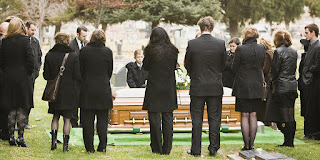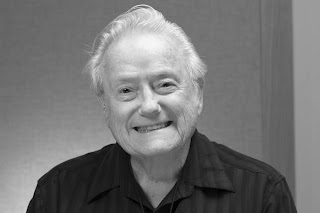Unfortunately, October has not been a great month for me. Despite a few good times, this month had some deaths as well, and in turn a few funerals and a lot of grieving. How we process this grief is different for everyone, but I don't think it's a secret that one of my emotional tools is to start writing about what bothers me. In the case of loss, this can be a powerful way to go through tough times. However, sometimes reality doesn't comply with what we want to express.
I think it's fair to say that October can be quite the grim month. A look outside my office window right now shows pewter skies threatening rain all day, people turning up their collars against the cold, damp wind, and leaves blowing about without much spectacle. In other words, October. It's the kind of somber day that makes us want to stay inside, heat up some tea, and enjoy the comfort of a warm blanket. It's not the day we want to have a funeral.However, such was not the case the other day. The sun was out and the sky was clear, no wind to bother anyone or chill in the air. The temperature was in the low 80s as I pulled into the funeral home parking lot. This day - unusual for October - was picture-perfect for something special and happy. A picnic. A first date. A trip to the zoo. Anything but a funeral service.
How does one use the tools of writing to process such a mismatched moment of time? Is there a proper way to churn through the sadness, grief, and feeling of loss without somehow losing the other very real qualities of the moment? Can we retain the feel of a very beautiful day and still express the clawing sense of loss?
Sometimes, writing these things down as cold, honest facts allows us to face the reality of our conflicted feelings - that is often what makes writing difficult. When we write about the splendid October day, we get in touch with our sense of guilt that we would rather be outside than in a funeral home, saying our final farewell to a loved one. That might sound selfish and cold, but if it is true then it is helpful to us as writers. When we face the painfully honest truth, we grow. It's not comfortable, but nothing worth having is easy.
When I wrote about the recent funeral, everything was about discomfort. The warm weather made it uncomfortable to be outside in a suit and tie. The people smoking outside the funeral home looked desperate to escape the sadness on the other side of the doors. Everyone had that nervous politeness and awkward smile hiding their grief. People sat in quiet contemplation while their hand tapped nervously against their leg to release the anxiety. And when everyone went to the graveside service, they all dipped their heads away from the bright sunlight, as if guilty to recognize a nice day.
I don't know if I will ever show anyone my writing about that day, and I have another funeral coming next week so there will definitely be more to come. However, I do know that by writing it down, I sorted out some of the more difficult feelings from that day. Furthermore, by going through that process, I grew a little as a writer. Maybe that's the only good thing I can take away from that day, but for now, it'll do.







